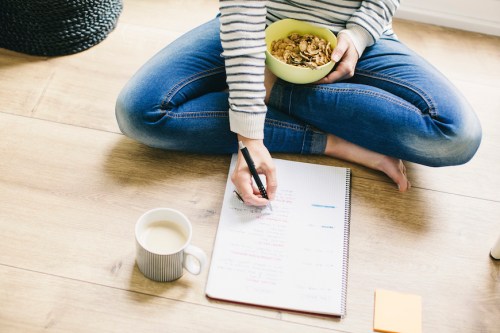There are two go-to responses right now to the underwhelming yet ubiquitous question of “how are you?”: a full-body guttural scream or “I’m taking things day by day.” The latter seems to be a healthy way of micro-processing this strange new reality, and it can be heartening to hear that many people are making baby steps forward. But if you’re more of a guttural-scream person, you might be confused about something crucial these well-adjusted and wise folks seem to inherently understand: Where does one learn how to take things day by day in any kind of effective way?
First things first, know that being “in the moment” is generally good advice to take. And that’s true even of this specific moment, when it feels like everything about the world totally and completely sucks because being present prevents our minds from worrying about the future or ruminating about the past.
“Anxiety tends to be about the future and sadness about the past, so by staying grounded in the here-and-now, we can lower the pull that these emotions can have on us.” —Amelia Aldao, PhD
“Anxiety tends to be about the future and sadness about the past, so by staying grounded in the here-and-now, we can lower the pull that these emotions can have on us,” says Amelia Aldao, PhD, licensed clinical psychologist specializing in anxiety disorders. “This is really what mindfulness is all about: being present in the moment in a non-judgmental way.”
And it’s more important now than ever given the global sense of uncertainty. Since we don’t know when, precisely, the coronavirus spread will calm, our social-distancing guidelines will lift, and what the world will look like when that happens, we can’t make any concrete plans for the near future. To that end, the way Dr. Aldao suggests learning how to take things day by day is to focus on current, short-term goals (such as what to make for dinner tomorrow or which days to exercise) and way-in-the-future long-term goals (like where you’d like to live one day). “By traveling far, far into the future, we also take away the power from the more immediate, uncertain present,” she says.
Below, get four more super-specific tips for how to actually take things day by day.
Confused about how to take things day by day in this weird new world? Here are a psychologist’s top 4 tips:
1. Have self-care goals that are specific, measurable, and achievable
“These don’t have to be super complex—they can be as easy as sending a few text messages to our friends and family members, doing a 15-minute workout, watching a TV show, or eating a sweet we really enjoy,” says Dr. Aldao. “This is particularly important for instilling a sense that the present matters and can have important rewards.”
Treat your self-care practices, then, like a reward you actually relish, because breaking out the yoga mat isn’t a treat for all people. Be honest with yourself about the difference between what you feel like you should do and what you actually want to do.
2. Practice gratitude
And practice that gratitude in whatever way you see fit. For those who are quarantining in groups, consider making a group gratitude jar, and use it by asking each person to contribute three thoughts on small pieces of paper each day. And if you’re by yourself, try to make a habit before bed of writing down something from the day that you enjoyed. Doing so may send you off to sleep with a sense of positivity.
3. Notice your moment-by-moment experience
Be mindful of the world around you—especially the small features that make your current day feel lovely. For example, my therapist recently mentioned that during our teletherapy sessions, I often point out the in-bloom cherry blossoms. Upon thinking about it, I realize how much I appreciate them, even when I’m recounting all the up-in-the-air worries ahead of me. “When you catch your mind drifting to worries about ‘when this will be over’ try to gently bringing the focus to your current experience,” says Dr. Aldao.
4. Work to embrace uncertainty
We all, to some degree, feel a need to predict the future, which isn’t an inherently bad inclination. After all, having goals and an idea of where you expect to be can provide for a sense of direction and control, but the urge can skew extreme and counterproductive—especially now.
“By fixating on wanting to predict and control everything, we only get more anxious, and thus feel out of control,” says Dr. Aldao. “The way to manage this better is by learning to let go of this need to predict and control—to be okay with some things being uncertain. And this applies beyond the COVID-19 situation, of course.”
To help foster a sense of calm, there are also plenty of free meditation apps to can help center you. And if you’re struggling, here’s how to get out of survival mode.
Sign Up for Our Daily Newsletter
Get all the latest in wellness, trends, food, fitness, beauty, and more delivered right to your inbox.
Got it, you've been added to our email list.











